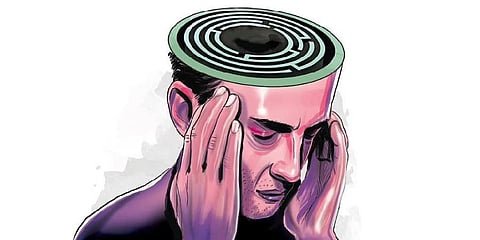

KOCHI: Will the observance of Mental Health Day change the lives of people? Well, it certainly enhances awareness about disorders of the mind. Translating this year’s mission into action may face several obstacles even at personal, family and social levels.
Stigma
It is one of the significant obstacles. A person on regular follow-up used to be always worried that others will recognise him outside the consulting room. He says that it is this professional support that helped him sail through difficult times in his life. Yet, he is unwilling to say so in public. He prefers not to identify as someone who lived a quality life despite mental illness.
Why? Let’s take a look
A study documented the stigma experiences of 732 people with schizophrenia in 27 countries. At least 72% felt the need to conceal their diagnosis and 64% felt they would be discriminated against at work. Fifty five per cent expected discrimination in close relationships.
Stigma deeply discredits and reduces the social value of patients. Many hesitate to seek help from a mental health professional due to the fear of being discredited. Misconceptions about scientific treatments add to this confusion.
Movies that depict mental disorders in a distorted or comical way strengthen the stigma. Politicians also openly use terms that refer to mental illness as abuse while discrediting opponents. This why disorders of the mind, mediated by brain mechanisms, are becoming subject of ridicule in society.
What about Kerala?
The national mental health survey indicated an 11.36% prevalence of mental health disorders among the population above 18 years in Kerala. Another study a few years ago estimated the prevalence as 12.43%.
However, a majority may not get proper intervention. Reaching out to them all and breaking the barriers are big challenges.
The suicide statistics for Kerala for 2021 are alarming. The numbers jumped from 8,500 to 9,549 and the rates from 24 per lakh to 26.9. The final stage that pushed these people to die by suicide is severe depression.
If the skills of the community to identify depression with suicidal thoughts increase, many can be helped. These gestures will emerge only if society accepts mental health as a priority. The same rule applies to mental disorders in general.
Remember Naranathu Bhranthan?
Naranathu Bhranthan, a fictional character, is known for gestures of insanity and philosophic messages. Daily, he struggles to get the heavy stone to the top of the hill. With no hesitation, he pulls it down after reaching the top. His action tells that the fruits of great efforts can be destroyed within no time.
A psychiatrist’s effort can be compared to Naranathu Branthan’s. The latent period for response to treatment, the popular misconceptions about mental illnesses, and the negative images of the medications are big obstacles.
Seeing a shrink itself is taboo. Yet, this healing profession can liberate people from symptoms. Once that is achieved, it’s not the professional who rolls the recovery down. It’s either the patient or those dear to them. Some shy away from treatment based on information from Google, or other myths. There are instances when patients have stopped medications after hearing a film dialogue. This should change.
Nuggets to ponder over
This year’s theme focuses on mental well-being for all, which is a key component that sustains overall health. Certain questions are relevant.
Do we foster emotional well-being?
The recent murders in which young people were involved indicate a lack of control over anger triggered the crime. There was no enmity. Situational issues ignited anger that culminated in murder. We hear about rage transforming secure places like homes into places of violence. The message is loud and clear — there is a need to cultivate emotional well-being in all, especially youth.
Are you part of the larger society? Are you feeling well there?
The ability to actively participate in a thriving community, culture and environment keeps societal well-being safe. Those who dissociate may feel a sense of isolation that could be a breeding ground for mental health morbidities.
What about physical well-being?
Erratic food styles, purposely altered sleep patterns, lack of exercise and indulgence in addictive substances have seriously affected the physical well-being of many. Choosing hazardous lifestyles is a behavioural disorder.
Is social well-being under threat?
This has become a matter of concern. In the digital world, real-world human interaction is shrinking. The ability to communicate, develop meaningful relationships with others, and maintain a support network is essential in overcoming loneliness. As many are withdrawing to a personal digital world, connections that preserve mental health are lost. It’s important to build social skills like gratitude, kindness and communication to create supportive relationships. The social well-being thus generated will be protective in a crisis.
How to take care of workplace well-being?
Some overwork and burn out. Some work less and rust out. Both of these scenarios will damage overall well-being. It is important to transform the workplace as a source of energy and inspiration. Initiatives to find new meanings and purpose in work are essential.
MENTAL HEALTH should be a top PRIORITY
Mental health should evolve as a personal priority, and most of the initiatives need to happen at this level. Let’s dream of a world that will not discriminate against people with mental disorders, where people will reach out to a mental health professional with no fear.